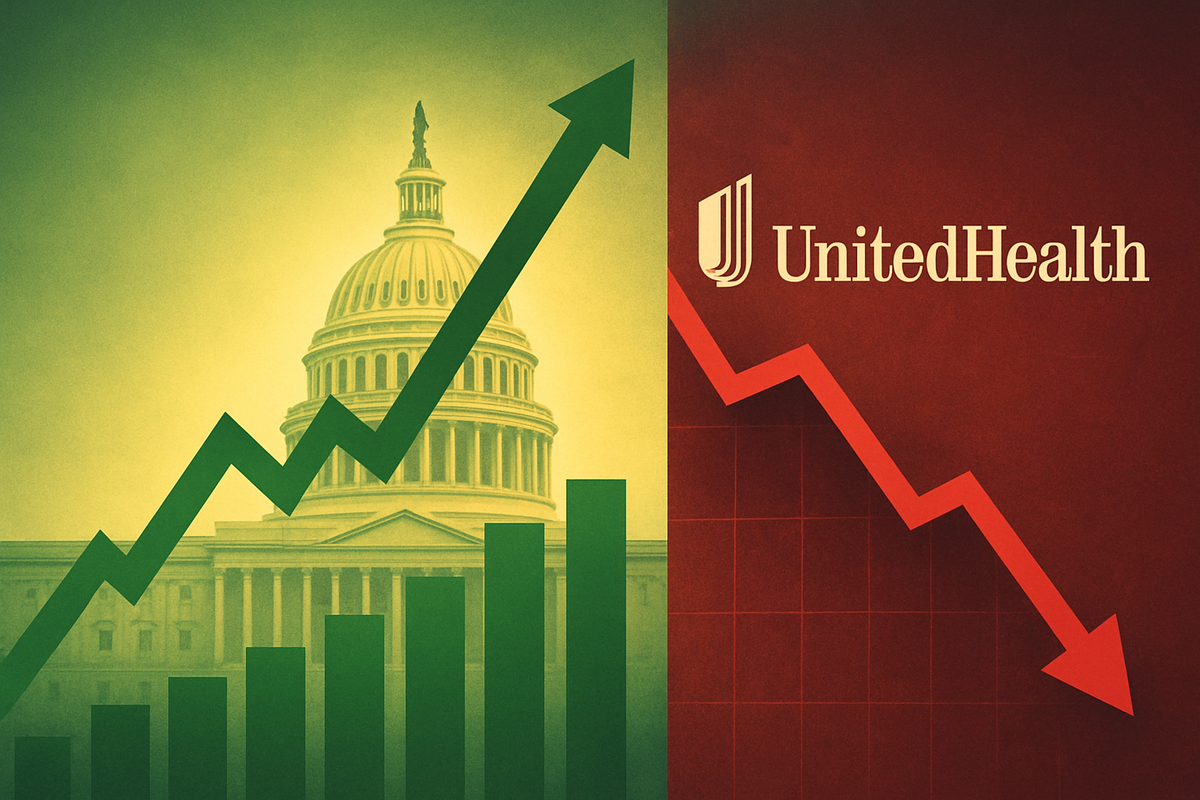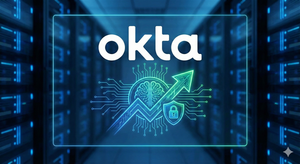
Washington D.C., November 10, 2025 – U.S. financial markets are experiencing a significant uplift today, with the Dow Jones Industrial Average and S&P 500 futures climbing steadily as lawmakers on Capitol Hill inch closer to a deal that would avert a prolonged government shutdown. The palpable sense of relief among investors signals a renewed optimism for economic stability, following weeks of uncertainty that had cast a shadow over market performance. However, this broad market cheer is not universally shared, as healthcare giant UnitedHealth (NYSE: UNH) continues its precipitous decline, battered by regulatory probes, escalating medical costs, and pointed political rhetoric.
The rally underscores the market's sensitivity to political stability and its eagerness to move past the fiscal brinkmanship that has characterized recent legislative efforts. While the impending deal offers a reprieve, the divergent fortunes of the broader market and a key industry player like UnitedHealth highlight the complex interplay of macroeconomic factors, sector-specific challenges, and political commentary shaping investor sentiment in late 2025.
Averted Crisis Ignites Market Optimism
The current market surge is a direct response to tangible progress in Washington towards resolving the U.S. government shutdown, which, at 40 days, had become the longest in the nation's history. On Sunday, November 9, 2025, the Senate successfully cleared a crucial procedural vote with a 60-40 margin, signaling strong bipartisan support for advancing a short-term funding deal. This legislative breakthrough aims to fund federal agencies until January 30, 2026, effectively pulling the economy back from the precipice of a full-blown shutdown and its associated disruptions.
Futures for the Dow Jones Industrial Average (DJIA) responded with gains between 0.2% and 0.6%, while S&P 500 futures advanced by 0.4% to 1.1%. The tech-heavy Nasdaq 100 futures saw even stronger momentum, rising between 0.6% and 1.7%. This positive opening on November 10 contrasts sharply with the preceding week's volatility, which saw the Nasdaq dip 3%, the S&P 500 shed 1.6%, and the Dow decline 1.2% amidst concerns over high valuations, particularly in artificial intelligence (AI) stocks, and the growing economic uncertainty fueled by the shutdown.
Analysts were quick to attribute the market's enthusiastic reaction to the reduced likelihood of continued government paralysis. The prolonged shutdown had not only created operational hurdles for federal agencies but also halted the release of critical economic data, such as inflation and employment reports. This data vacuum left investors and the Federal Reserve "groping around in the dark," hindering informed decision-making regarding the true state of the U.S. economy and the outlook for interest rates. The anticipated resolution suggests that with political uncertainty clearing, markets are poised to refocus on fundamental economic indicators and potentially deliver robust returns into the new year, aligning with historical patterns observed after periods of political gridlock.
UnitedHealth Faces Headwinds Amidst Broader Market Rally
While the broader market celebrates the potential end of the government shutdown, UnitedHealth (NYSE: UNH) finds itself in a precarious position, with its stock experiencing a significant and sustained downturn. On November 6, 2025, UNH shares recorded their seventh consecutive session of losses, falling 1.9% and nearly 8% in the preceding six sessions alone. The stock was down 12% over the past month, a staggering 34.4% year-to-date, and 40.4% over the last year, closing at $324.21 per share on November 7. The negative momentum continued into November 10, with shares losing another 1.8% in premarket trading.
The primary drivers behind UnitedHealth's struggle are multifaceted and largely distinct from the government shutdown narrative, though some political commentary has exacerbated investor concerns. A major contributing factor is an ongoing criminal and civil investigation by the U.S. Department of Justice (DOJ) into the company's Medicare Advantage billing practices. Allegations of Medicare fraud and illegal claims denial practices have severely "soured investor sentiment" across the entire health insurance sector since revelations emerged in April.
Compounding these regulatory woes are significant concerns over elevated medical costs within UnitedHealth's Medicare Advantage (MA) plans. The company's medical care ratio notably increased from 89.25% in Q2 2025 to 89.9%, and it anticipates Medicare Advantage medical cost trends around 10% for 2026. This escalation is attributed to continued high utilization of care, changes in fee schedules, and aggressive provider coding practices. Furthermore, profitability in Medicaid and Medicare has been impacted by aggressive pricing from competitors and higher-than-expected utilization of services, including behavioral health, GLP-1 drugs, and elective surgeries. Leadership changes, including the resignation of the former CEO in May 2025, and the subsequent withdrawal of its 2025 financial outlook due to cost overruns in its Medicare Advantage business, have further eroded investor confidence. Adding to the pressure, on November 10, President Donald Trump made statements advocating for federal funding under the Affordable Care Act (ACA) to go directly to the public rather than to "money-sucking insurance companies," directly contributing to the fall of UnitedHealth and other health insurers on that day.
Wider Significance and Market Implications
The impending resolution of the government shutdown carries significant wider implications for the U.S. economy and financial markets, extending beyond immediate stock price movements. Averted shutdowns bolster investor confidence in government stability, which is crucial for long-term planning and investment. The cessation of the data blackout, which had left the Federal Reserve and analysts in the dark about key economic indicators like inflation and employment, will allow for a clearer assessment of economic health and more informed monetary policy decisions. This renewed clarity is expected to refocus market attention on fundamental economic performance rather than political brinkmanship.
The impact on various sectors will be uneven. While most industries will benefit from reduced uncertainty, sectors heavily reliant on government contracts or regulatory approvals, such as defense, infrastructure, and certain healthcare segments, will experience a more direct positive impact from the resumption of normal federal operations. Conversely, the healthcare sector, particularly health insurers like UnitedHealth (NYSE: UNH), faces persistent challenges. The compromise bill to end the shutdown notably did not include a full-year extension of Affordable Care Act (ACA) subsidies, a key Democratic demand, though a December vote on these subsidies was promised. This ongoing policy uncertainty, coupled with presidential statements about redirecting ACA funding, keeps the sector under a microscope. Historically, market reactions to government shutdowns or near-shutdowns are often short-lived, with a quick recovery once a resolution is reached, as investors typically price in the temporary nature of such disruptions. However, the depth of UnitedHealth's current issues suggests that its recovery will depend more on resolving its specific regulatory and cost challenges than on the broader political climate.
The Road Ahead: Navigating Post-Shutdown Dynamics
Looking ahead, the short-term outlook for the U.S. market appears cautiously optimistic, contingent on the finalization and implementation of the government funding deal. The immediate relief from averted fiscal calamity is likely to fuel continued positive sentiment, with investors potentially re-engaging with riskier assets. However, the short-term nature of the funding deal—extending only until January 30, 2026—means that political uncertainty regarding federal spending will resurface in early next year. This recurring deadline could lead to renewed market jitters as the next funding battle approaches, requiring companies and investors to remain agile in their strategic planning.
For public companies, particularly those with significant exposure to government contracts or regulatory frameworks, the resumption of normal federal operations will allow for cleared backlogs in payments, approvals, and contract awards. This could provide a much-needed boost to operational efficiency and revenue streams. However, companies in the healthcare sector, especially managed care organizations, face a more complex future. UnitedHealth (NYSE: UNH) and its peers will need to navigate intensified regulatory scrutiny, adapt to evolving healthcare policy debates, and address rising medical costs. Strategic pivots might include re-evaluating Medicare Advantage pricing, enhancing compliance programs, and potentially diversifying revenue streams to mitigate policy risks. Market opportunities may emerge in sectors poised to benefit from increased government spending or stable economic conditions, while challenges will persist for industries grappling with specific regulatory or cost pressures.
A Cautious Optimism Amidst Sectoral Headwinds
The recent market rally, driven by the impending resolution of the government shutdown, represents a significant moment of relief for investors. The Dow Jones and S&P 500's upward trajectory reflects a collective sigh of relief that the U.S. economy has, for now, dodged a major self-inflicted wound. This event underscores the critical importance of political stability for market confidence and the broader economic outlook. The swift rebound also highlights the market's tendency to quickly price in and move past temporary political disruptions, refocusing on underlying economic fundamentals once certainty returns.
Moving forward, investors should watch for the full implementation of the government funding deal and any subsequent economic data releases, which will provide a clearer picture of the nation's financial health. While the immediate crisis is averted, the short-term nature of the funding agreement means that the specter of future fiscal debates looms. For companies like UnitedHealth (NYSE: UNH), the path to recovery is more arduous, deeply intertwined with resolving ongoing regulatory challenges, managing escalating medical costs, and adapting to a dynamic healthcare policy landscape. The market moving forward will likely be characterized by a cautious optimism, with a keen eye on both macroeconomic indicators and sector-specific developments, particularly in politically sensitive industries like healthcare. Investors should remain vigilant for policy shifts, regulatory actions, and corporate responses that will shape market performance in the coming months.
This content is intended for informational purposes only and is not financial advice





